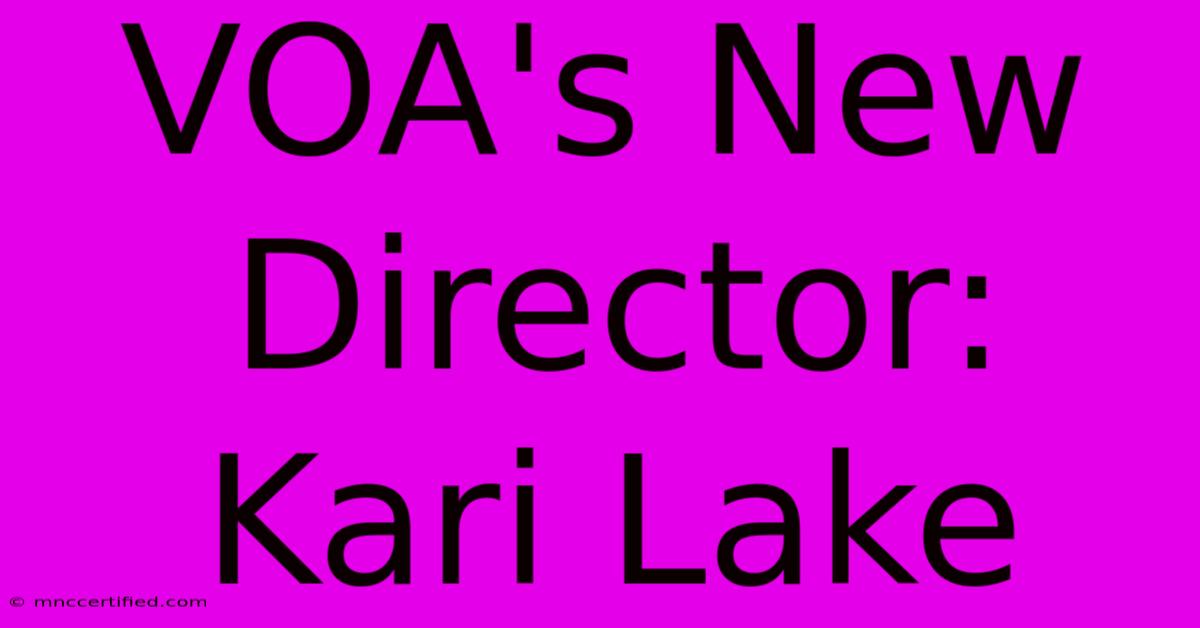VOA's New Director: Kari Lake

Table of Contents
VOA's New Director: Kari Lake? Separating Fact from Fiction
The recent claim that Kari Lake has been appointed as the new director of the Voice of America (VOA) has sparked significant online discussion and confusion. This article aims to clarify the situation, separating fact from speculation and providing accurate information about the leadership of this crucial international broadcasting service.
The Claim: A Viral Misinformation Campaign
Social media platforms have been buzzing with posts alleging Kari Lake's appointment as VOA director. These posts often lack credible sources and frequently employ emotionally charged language, characteristic of misinformation campaigns. The rapid spread of this false information highlights the importance of verifying news from reputable sources before sharing it.
The Reality: No Evidence of Appointment
At the time of writing, there is no official confirmation from the U.S. government, the VOA, or any credible news organizations confirming Kari Lake's appointment as director. The official websites of the VOA and the U.S. Agency for Global Media (USAGM), which oversees VOA, do not mention her name in their leadership sections. The absence of this crucial information from official channels should be a significant red flag.
Understanding the Importance of Fact-Checking
The proliferation of misinformation, particularly online, necessitates a critical approach to information consumption. Always verify news from multiple reputable sources before accepting it as fact. Relying on established news organizations, government websites, and official press releases ensures access to accurate information.
Who Currently Leads the VOA?
The current leadership structure of the VOA is available on the official website. Verifying this information directly from the source is crucial in combating misinformation. Checking for updates and press releases from the USAGM also helps stay informed about any official changes in leadership.
The Dangers of Misinformation
The spread of false information, like the claim about Kari Lake's appointment, can have serious consequences. It erodes public trust in institutions, fuels political polarization, and can even lead to real-world harm. Active participation in combating misinformation is essential for maintaining a healthy information ecosystem.
How to Identify Misinformation:
- Check the Source: Is the source reputable and known for accuracy?
- Look for Evidence: Does the information cite credible sources and evidence?
- Consider the Tone: Is the language emotionally charged or biased?
- Cross-Reference: Verify the information with multiple credible sources.
- Be Skeptical: Don't blindly accept information at face value.
Conclusion: Critical Thinking in the Digital Age
In the digital age, where information spreads rapidly, critical thinking skills are paramount. Always question the source, seek corroboration, and rely on official channels for accurate information. The false claim regarding Kari Lake's appointment to the VOA serves as a stark reminder of the importance of responsible information consumption and the dangers of unchecked misinformation. The spread of this false claim underscores the need for media literacy and responsible digital citizenship. Staying informed and actively combating misinformation is crucial for a well-functioning democracy.

Thank you for visiting our website wich cover about VOA's New Director: Kari Lake. We hope the information provided has been useful to you. Feel free to contact us if you have any questions or need further assistance. See you next time and dont miss to bookmark.
Featured Posts
-
Thursday Night Guerendo Suits Up
Dec 13, 2024
-
Manchester United Wins Hojlunds Debut
Dec 13, 2024
-
Week 15 Lineup Cooper Kupps Status
Dec 13, 2024
-
The Wanteds Max George Rushed To Hospital
Dec 13, 2024
-
Max George The Wanted Hospital Visit
Dec 13, 2024